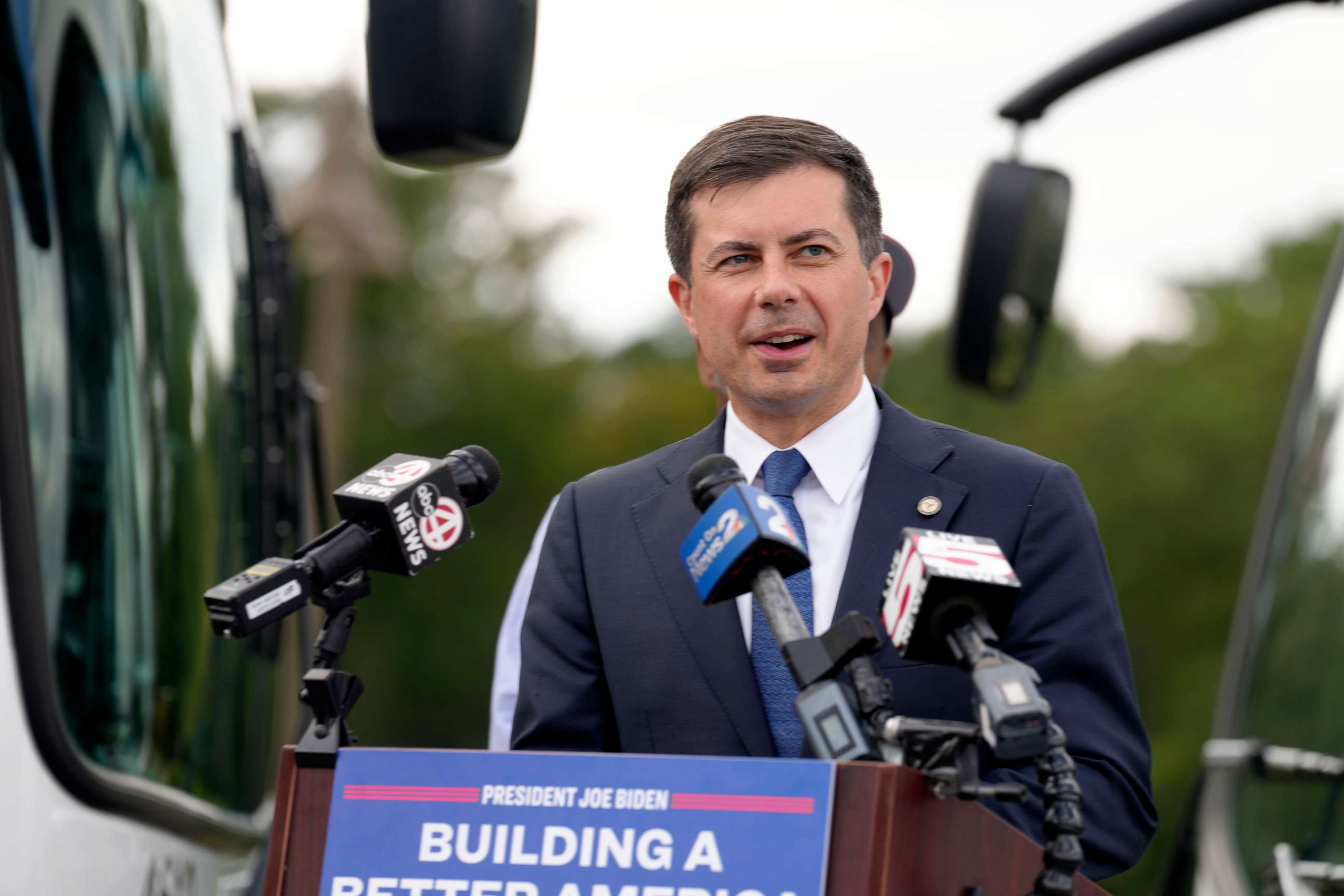Recession is 'possible but not inevitable,' Buttigieg says as he touts supply chain focus
The White House is focused on "the foundations" of the economy, he said.
With year-over-year inflation barely easing in the latest Consumer Price Index report despite sharp increases in interest rates meant to cool the economy, Transportation Secretary Pete Buttigieg said Sunday that a recession is "possible but not inevitable."
Buttigieg was asked in an interview on ABC's "This Week" if the threat of recession worried him.
"Look, it's possible but not inevitable. ... A part of why we do see a lot of pressure on prices is that while the demand has come back, Americans have more income because Americans have jobs in this almost historically low level of unemployment," Buttigieg told anchor George Stephanopoulos, adding that it's "been hard for the supply side to keep up."
"That's a big part of what we're working on -- on the infrastructure side -- dealing with some of the bottlenecks we have, dealing with some of the constraints that we have in transportation infrastructure that's needed to be upgraded for decades," Buttigieg said, referring to a supply-chain crunch exacerbated by the COVID-19 pandemic.
President Joe Biden said last week that he believed an economic downturn was unlikely but conceded there could be a "very slight recession." His comments came after Jamie Dimon, the CEO of the largest bank in the United States, JPMorgan Chase CEO, warned a recession is likely within six to nine months because of Russia's war in Ukraine and historically high inflation and the rising interest rates to combat those prices.
The Federal Reserve has raised interest rates five times so far this year and is expected to again next month.
Stephanopoulos pressed Buttigieg on what more Biden could do about rising prices after the president said he would soon be announcing more steps to tackle inflation and, particularly, the cost of gas.
Buttigieg emphasized that he didn't want to "get ahead of the president," but he highlighted how Biden had ordered the release of fuel from the country's strategic petroleum reserve and waived a requirement on ethanol blending for gas stations.
"This is part of a bigger focus that the president has sustained throughout this year on fighting inflation and creating more of that breathing room for American families," Buttigieg said.
While gas prices have fallen sharply from a summer high -- now averaging about $3.90, down from $5.02 in mid-June -- they are 20 cents higher than they were just a month ago, according to AAA. Buttigieg laid some of the blame with oil companies, who have defended themselves from criticism of excessive profits.

The economic headwinds could cost Democrats their slim congressional majorities this November.
Stephanopoulos asked Buttigieg how the party should address high inflation with just 23 days until the midterm elections. Polls show it is a major factor in Biden's low approval rating, with voters giving Republicans the advantage on handling the economy -- and Republicans have, in turn, made the state of the economy central to their campaign messaging.
"Good policy is good politics. And we have been doing the right thing for the American people with proposals and achievements, legislatively, that are popular because they make sense," Buttigieg said. He pointed to a bipartisan infrastructure funding bill that was signed in 2021, which has allowed for improvements to bridges, roads and airports across the country, as well as the recently enacted Infrastructure Reduction Act (IRA), which contains provisions aimed at lowering health care costs.
Buttigieg suggested that the November elections were important for making sure those policies continue: "It's why we can't turn back on the progress that's been made, especially because we know there's still a long way to go."
He cited some conservative objections to allowing Medicare to negotiate prescription drug prices, which was a major part of the IRA. GOP lawmakers have said the negotiation power is a "price control" that will hamstring pharmaceutical development.
"It's the wrong time to do anything that would increase costs for health care or anything else for the American people," Buttigieg said.
Stephanopoulos asked whether Biden should spend more time highlighting the White House's other 2021 successes, like the direct COVID relief payments and a temporary expansion of the child tax credit which expired at the end of last year.
Buttigieg said "we are proud of those accomplishments," and then noted what he believed were others, such as a funding bill for domestic manufacturing, a veterans' health care bill and Biden's initial COVID-19 relief bill when the economy "was at risk of going into free-fall."
"In some ways having achieved so much legislatively makes it hard to talk about all at once because there are just so many," he said.




